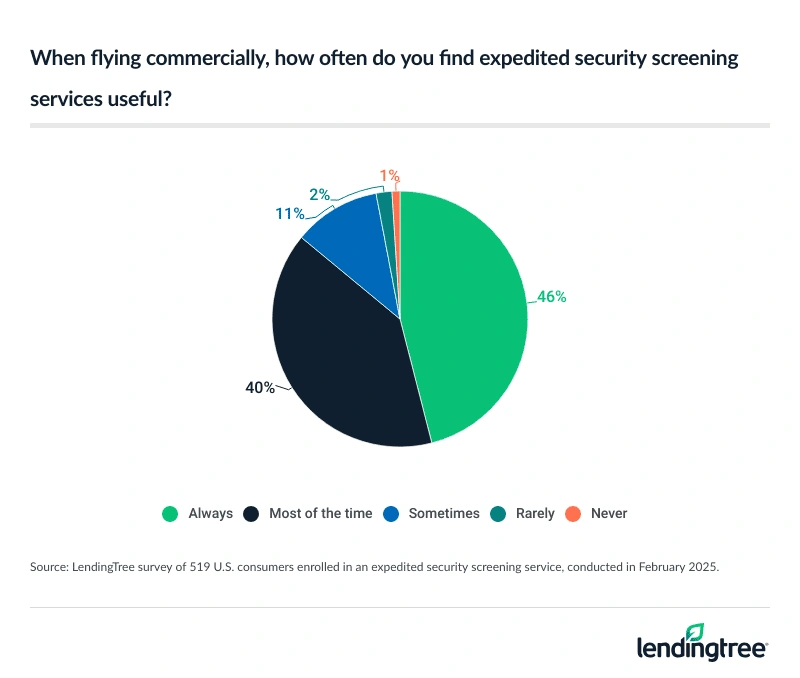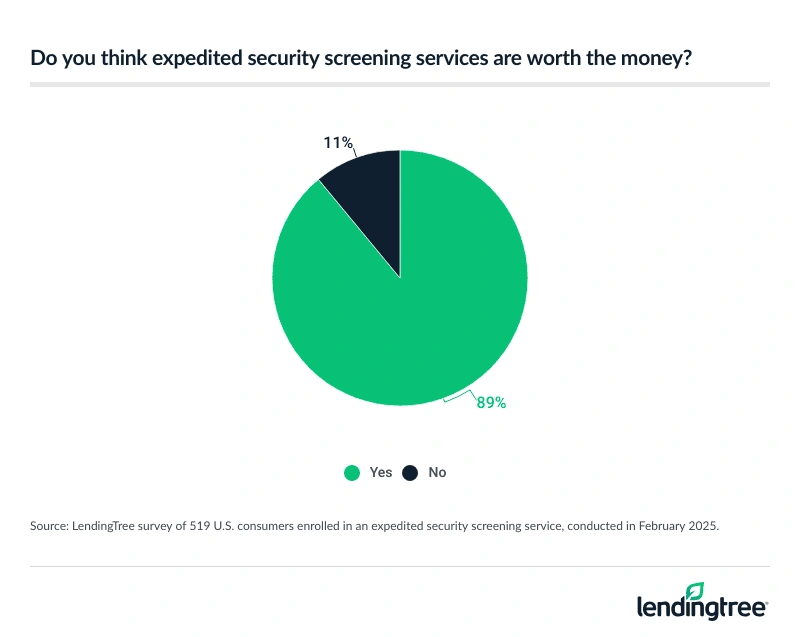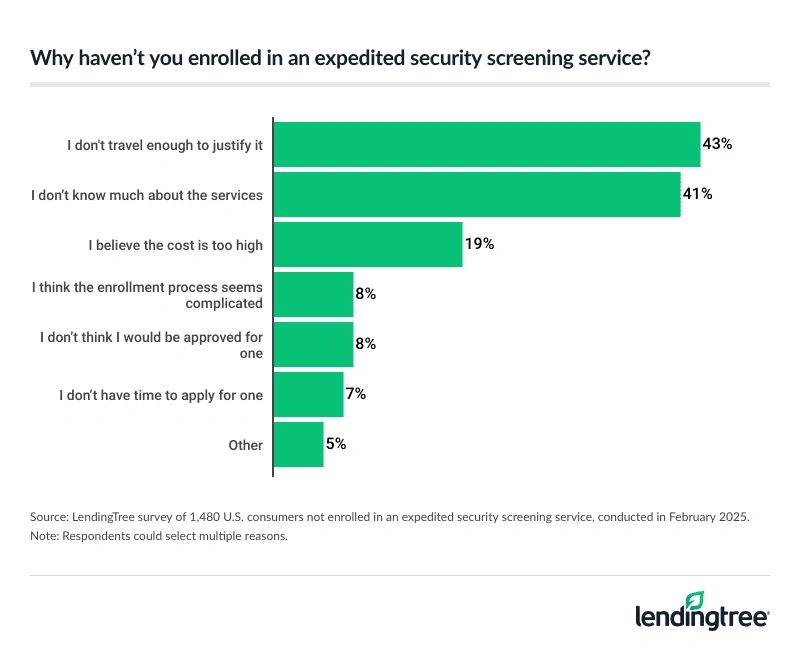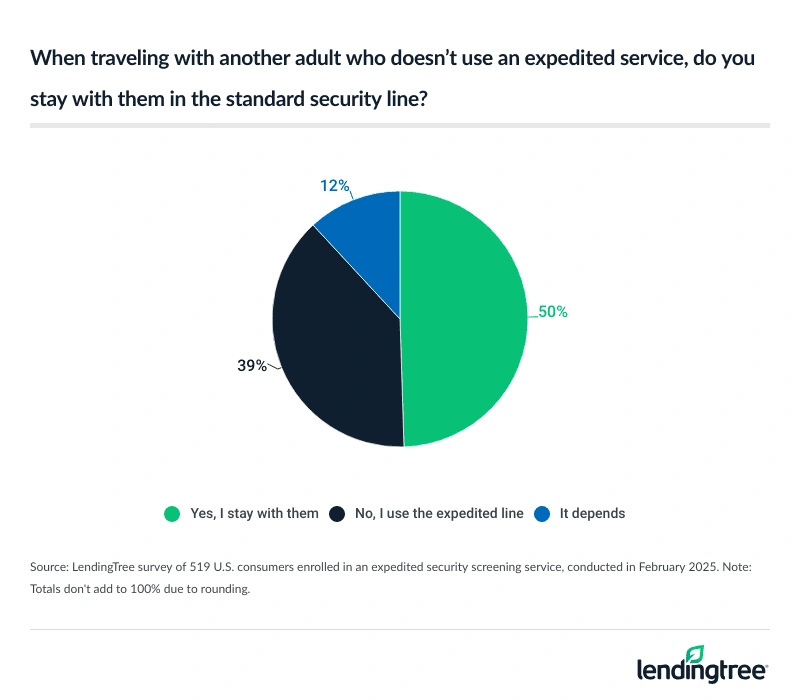51% of Travelers With Expedited Screening Have Left Companions Behind
More than 1 in 4 Americans are enrolled in expedited screening services such as TSA PreCheck or Global Entry, according to a new LendingTree survey. However, many who use these services don’t have much patience for fellow travelers who don’t.
Expedited screening services have boomed in recent years, in large part because many travel credit cards now reimburse sign-up costs. With that in mind, LendingTree surveyed about 2,000 Americans to get their views on these services.
We found that those reimbursements — typically in the form of a statement credit — have enticed many to sign up in search of more streamlined travel. But our survey also showed that more sign-ups have led to more frustration for some, including those who say the so-called expedited lines are sometimes longer than the regular lines.
Keep reading for more on our findings.
- About a quarter of travelers take advantage of expedited screening. 26% of Americans are enrolled in at least one of these services, led by TSA PreCheck (14%), NEXUS (10%) and Global Entry (9%). 30% enrolled in at least one say their primary motivation is shorter security lines, 25% say it’s offered as a credit card benefit or perk and 18% say it affords less hassle at security.
- Most recommend expedited screening — but not all of the time. 93% who utilize one of the services would recommend it to other travelers, and 89% say it’s worth the money. However, 56% say they’ve experienced longer security lines with their expedited service than those in regular ones.
- Expedited screening services aren’t for everyone. Among Americans without an expedited service, 43% say they don’t travel enough to justify it, 41% don’t know much about them and 19% believe the cost is too high. When traveling with someone who leaves them behind for an expedited line, nearly half who’ve experienced it (47%) say they understand it.
- These services can cause strife among travelers. Over half (52%) of those with an expedited service say they’d stop traveling with someone who consistently refused to use one. Additionally, 51% say they sometimes abandon their fellow travelers who don’t utilize an expedited service, but 39% of them feel at least somewhat guilty about it.
About 1 in 4 travelers take advantage of expedited screening
There’s not much that virtually all Americans agree on these days. However, good luck finding anyone who doesn’t think air travel is a headache.
Whether you only travel once or twice every few years or you’re a first-class frequent flier with elite status everywhere, you’d probably love ways to make your next flight a little easier.
That’s where expedited screening can come in handy. These services typically don’t make the security lines disappear entirely, nor are they without their quirks and foibles, but there’s little question they can make your travel day easier.
More than a quarter of Americans (26%) are enrolled in at least one of these services, our survey found. TSA PreCheck (14%) is the most common choice, followed by:
- NEXUS (10%)
- Global Entry (9%)
- CLEAR (7%)
- SENTRI (6%)
Men are more likely than women to currently utilize these services (33% versus 19%). Also, the younger you are and the higher your income, the more likely you are to be enrolled now.
When current enrollees were asked why they signed up, 30% said their primary motivation was shorter security lines, the most common answer. A quarter of subscribers (25%) say they enrolled because their credit card offered it as a perk, 18% say it affords less hassle at security and 16% say they felt pressured to do so to keep up with others.
Regardless of their initial motivation, virtually all subscribers (97%) feel the service is useful at least sometimes, including 46% who say it’s always useful.

Most recommend expedited screening — but not all the time
Our survey makes it crystal clear that people don’t just find expedited screening useful. They love it enough to recommend it to others — 93% who utilize a service say so.
Still, these services generally aren’t free. Sure, you can often get reimbursed by your credit card issuer for the subscription cost, but you’ll still have to make that initial payment. For example, TSA PreCheck costs start at $76.75 (for new enrollees), and the service lasts for five years, while Global Entry, which helps with faster U.S. customs screenings for international travelers, costs $120 for five years. (Note: If you purchase Global Entry, you automatically get TSA PreCheck, too.)
About 9 in 10 enrollees (89%) say expedited screening is worth the money.

These services aren’t perfect, however. More than half of enrollees (56%) say they’ve previously experienced longer security lines with their expedited service than those in regular ones. Still, given their near-unanimous willingness to recommend these services, subscribers clearly aren’t terribly bothered by the occasional inconvenience.
Expedited screening services aren’t for everyone
Despite all the perks, nearly 3 in 4 Americans (74%) aren’t enrolled in an expedited screening service. That includes 68% who’ve never been part of one and 6% who previously enrolled but have since canceled.
There’s a massive age and income gap in enrollment in these services. In fact, 81% of baby boomers ages 61 to 79 say they’ve never been enrolled, compared with just 55% of Gen Zers ages 18 to 28. Meanwhile, 82% of those earning less than $30,000 a year have never enrolled, versus only 51% of those making $100,000 or more a year.
When we asked Americans without an expedited service why they hadn’t enrolled, the most common answer, from 43% of respondents, was that they don’t travel enough to justify signing up. Other common responses include 41% who say they don’t know much about the services and 19% who believe they cost too much.

These services can cause strife among travelers
What happens when someone with expediting screening travels with someone who doesn’t have that privilege? Things can get a little messy.
Half of subscribers to expedited screening services say they sometimes abandon their fellow travelers who don’t subscribe, though 39% of them feel at least somewhat guilty about it. Men are more likely than women to stay with them (52% versus 45%), while millennials ages 29 to 44 are more likely to do so than Gen Zers (57% versus 52%).

Our survey also found that expedited screening is important for a potential long-term travel partner to have. Slightly more than half (52%) of expedited service subscribers say they’d stop traveling with someone who consistently refused to use one. That rate grows to 62% among parents of young kids and 60% among millennials and Gen Zers.
The good news for expedited screening travelers is that those without it aren’t likely to be too upset if you leave them in the standard line. Among those who’ve been left behind, nearly half (47%) say they understand the decision, and another 27% say they don’t have strong feelings about the move. Just 7% say they’d consider never traveling with them again.
Choose your expedited screening service wisely
I’ll admit it: I love my TSA PreCheck. However, I fly pretty regularly, both for work and for fun with my family. However, if you don’t fly very often and you don’t get reimbursed by your credit card issuer for the enrollment cost, you may not need to bother with it.
If you decide to take the plunge, it’s important to be aware of the differences among the various services. For example:
TSA PreCheck
- Expedited screening for domestic travelers at participating U.S. airports
- Cost: Starting at $76.75 (for new enrollees) for 5 years
Global Entry
- Expedited screening at participating U.S. airports when returning from international travel (includes TSA PreCheck)
- Cost: $120 for 5 years
NEXUS
- Expedited screening when traveling between the U.S. and Canada (includes Global Entry and TSA PreCheck)
- Cost: $120 for 5 years
SENTRI
- Expedited screening when traveling between the U.S. and Mexico (includes Global Entry and TSA PreCheck)
- Cost: $120 for 5 years
CLEAR
- Expedited biometric identity verification at participating U.S. airports (doesn’t include access to the PreCheck line)
- Cost: $199 per year
Learn more about Trusted Traveler Programs pricing
As you can see, the various services have significant cost differences and coverages. If you only fly domestically, TSA PreCheck will likely be all you need. But if you’re a regular international flyer, spending a little bit extra on Global Entry may be a wise choice.
There’s no one-size-fits-all answer for the best service for everyone, so it’s important to take the time to decide which one works best for you and your family’s needs. That decision process should also include reviewing your current credit cards’ perks to see if they offer reimbursement.
If they don’t, it may be worth shopping for a card that does. Just make sure you understand the fees, rates and other details associated with the cards before you apply. The last thing you need is to sign up for a credit card in an attempt to save money only to lose some.
Methodology
LendingTree commissioned QuestionPro to conduct an online survey of 1,999 U.S. consumers ages 18 to 79 from Feb. 20 to 21, 2025. The survey was administered using a nonprobability-based sample, and quotas were used to ensure the sample base represented the overall population. Researchers reviewed all responses for quality control.
We defined generations as the following ages in 2025:
- Generation Z: 18 to 28
- Millennial: 29 to 44
- Generation X: 45 to 60
- Baby boomer: 61 to 79

